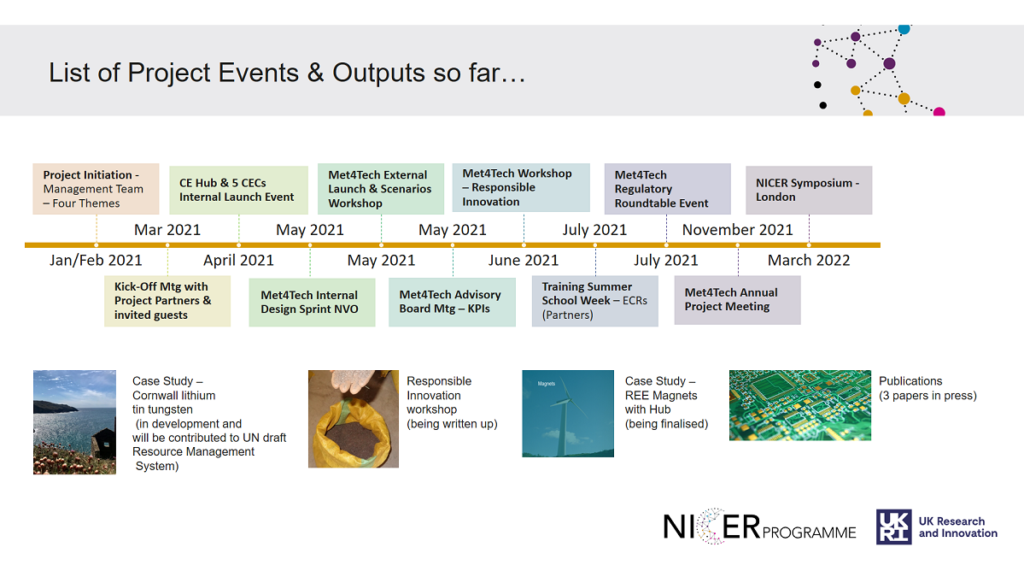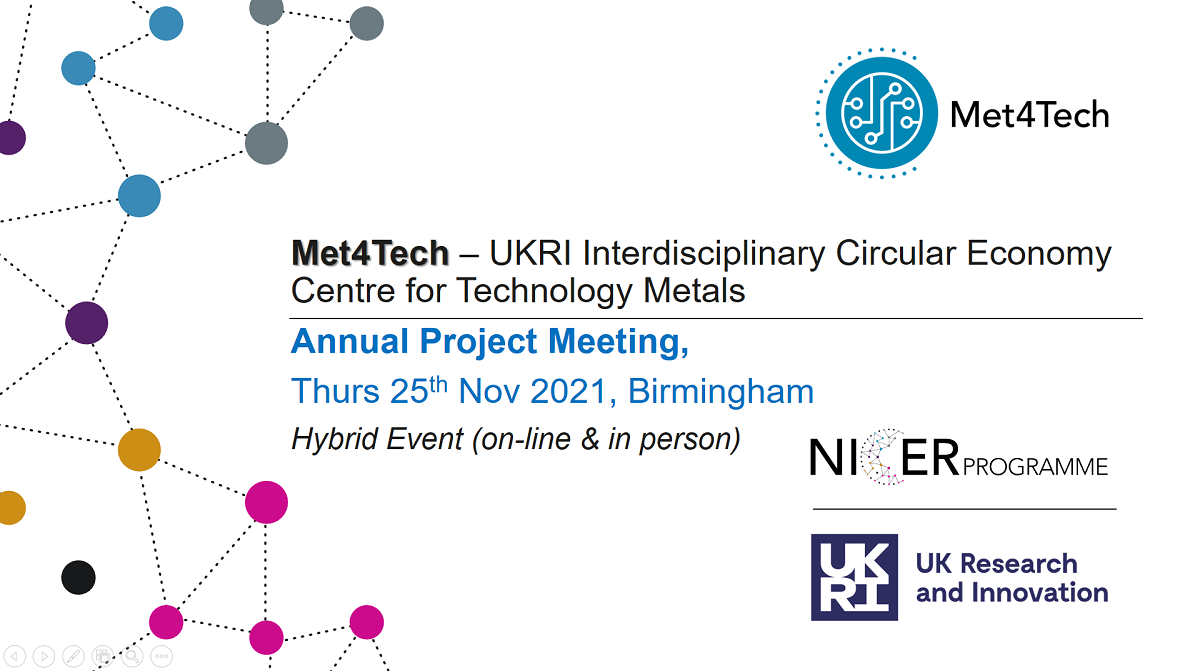After some initial trepidation around in-person events, the first Annual Project Meeting for Met4Tech was successfully held as a hybrid meeting on 25 November 2021 at the impressive Edgbaston Conference Park in Birmingham and broadcast live as a webinar with over 50 participants.
Representatives from the many project partners and several Industrial associates were present to collectively discuss the research progress for the project, and to examine the overall goals and ambitions of the Met4Tech CE Centre. The day consisted of presentations on each of the four thematic areas as well as showcases of key topics such as life cycle analysis (LCA), regulatory mapping, and responsible innovation.
The plenary session utilized the PESTLE framework – Policy, Economic value chain, Social/ESG, Technology, Legal, Environmental/LCA – for an open discussion amongst small groups of delegates who assessed the current challenges to achieving a circular economy for technology metals.

The guest speakers included project partners from the International Tin Association (ITA), HyproMag, Levin Sources and the Critical Minerals Association (CMA).
The ITA warned of a potential disconnect between industry and academic standpoints, and highlighted the need and desire to bridge this perspective gap. The academics were invited to consider: what is the business case for investing in Circular Economy solutions; and can the project prove that changes are agile enough to weather geopolitics and supply chain turbulence?
This conundrum is being investigated across the themes and will be addressed in Thematic Area 4; development of the Met4Tech Roadmap. The foundations of the tech metals Roadmap are materializing from the examination of data, scenarios, interventions and options. Over the coming year the teams at Manchester, Birmingham and Exeter Universities will conduct Deep Dive and Spark sessions, leading towards constructor workshops and user testing of the tech metals Roadmap and CE principles.
HyproMag demonstrated the effectiveness of their new magnet stripping technique using hydrogen. The location of the conference also allowed for groups to take a tour of the Hyrpomag laboratories. Many attendees took this opportunity to see first-hand the progress being made in separating and recycling NdFeB magnets. Hypromag are a new company licencing patented processing techniques developed in the University of Birmingham School of Metallurgy and Materials. They recently received £4.4 million of predominantly capital funding to scale up the HPMS process and magnet manufacture.
Thematic Area 3 led by the Universities of Leicester and Birmingham builds on the progress made within the magnet sector research and other battery projects by advancing several novel separation and recycling techniques for technology metals, linking together chemistry, materials science, AI and robotics.
Levin Sources’ role in Met4Tech is in supporting the development of case study examples of new Geo-model(s) for cobalt mining in Thematic Area 2. Levin Sources’ focus on responsibility in global mineral supply chains and achieving better social, economic and environmental outcomes for producer countries in the Global South, in particular SMEs (e.g. artisanal miners) and communities is a vital asset in determining mechanisms for alternative economic models.
The Critical Metals Association are the UK’s voice to Government on critical minerals and supply chains. Amongst other achievements the CMA touched upon their publication of ‘A Blueprint for Responsible Sourcing of Critical Minerals’ (ESG Report); engagement across multiple resource sectors and aptitude at providing evidence to multiple House of Commons Select Committees, during their presentation.
Policy direction and circular economy successes will be decided on evidence and data from many areas. Creation of the National Virtual Data Observatory (NVO) in Thematic Area 1 is well underway led by the British Geological Society (BSG) and Exeter university, and the NVO model concept will be tested by user groups through further deep dive workshops in the coming year. The NVO is a key outcome from Met4tech, that will be maintained by the BGS. This observatory was conceived to develop a circular economy knowledge base for assessing flows and stocks of technology metals across their value chains. The NVO will enable access to data from multiple sources through a single online portal.
In conclusion, it was highly rewarding to convene such a diverse mix of expertise from across the Met4Tech partner network of academic researchers and industry associates, both in the room and online for a full day of intense collaboration.
We gratefully acknowledge this valuable input from our partners, and look forward to the next Met4Tech project conference in Spring 2022, as well as the upcoming NICER Showcase in London in March 2022.


0 Comments